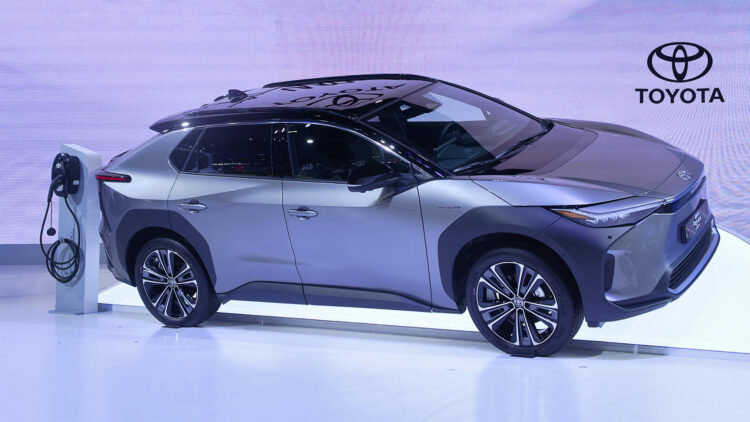Toyota, Japan’s leading automaker, has announced its ambitious plans for the future of battery electric vehicles (EVs) and its commitment to developing solid-state batteries. The company aims to combat climate change and catch up with its rivals in the EV market. Toyota’s new president, Koji Sato, acknowledges the criticism the company has faced and emphasizes the need for an aggressive shift towards electrification.
A key aspect of Toyota’s plan is the development roadmap for EV batteries. The company plans to release at least two major iterations by 2028. Toyota believes that by that time, it will have an EV in the market with a WLTP range of close to 900 miles on a single charge.
Speaking at the company’s Tokyo headquarters, Sato addressed the pressure to accelerate its electric car offerings, stating, “We like to see that as people cheering Toyota on.” He also highlighted the advantages of EVs in terms of software functions, connectivity, and intelligent features that enhance services and entertainment for customers.
Toyota, known for its expertise in hybrid vehicles, is committed to revamping its entire production system to deliver high-quality EVs under the Toyota and Lexus brands. The company’s current lineup includes the bZ4X electric compact crossover, built on the e-TNGA platform developed in collaboration with Subaru. This platform is also used in the popular Prius and Lexus models. The bZ4X is already available in multiple markets worldwide.
To strengthen its presence in the Chinese market, Toyota recently unveiled the bZ3, an electric car developed in collaboration with Chinese EV manufacturer BYD. The partnership also involves state-owned Tianjin FAW and other partners. Toyota aims to solidify its position in the evolving EV market by leveraging these collaborations and its extensive experience with the groundbreaking Prius.
One of the main challenges for EV adoption is charging time. In response, Toyota is targeting a commercial solid-state battery by 2027, which could significantly reduce charging time to 10 minutes or less. The company believes that this breakthrough technology, combined with an expanded EV lineup and ongoing technological advancements, will enable them to deliver 1.5 million EVs globally by 2026. Toyota also continues to work on innovating lithium-ion batteries to offer more affordable options.
While focusing on EVs, Toyota remains committed to advancing hydrogen fuel cell technology. The company envisions a ‘hydrogen society’ and collaborates with partners to produce cleaner and more cost-effective hydrogen, leveraging both renewable and non-renewable energy sources.
Although Toyota’s commitment to electric and hydrogen vehicles is commendable, the automaker is expected to face scrutiny at its upcoming shareholders’ meeting regarding its climate change commitments and the pace of its transition to electric mobility.
Toyota’s ambitious plans and technological advancements demonstrate its determination to adapt to the evolving automotive landscape and address the urgent need to reduce carbon emissions. With its vast resources and manufacturing expertise, the company aims to regain its competitive edge in the EV market while exploring sustainable mobility solutions for the future.
Toyota’s EV and Battery Production Endeavors Come to Fruition
In recent years, the global automotive industry has witnessed a significant shift towards electrification. As the world aims to address climate change and reduce greenhouse gas emissions, automakers have been compelled to invest in electric vehicle (EV) technologies. One such industry leader, Toyota, has been at the forefront of this transformation, with its relentless pursuit of sustainable mobility solutions. By staying true to its commitment, Toyota’s EV and battery production endeavors have finally come to fruition.
Toyota’s commitment to sustainable transportation was evident from the early stages of the EV revolution. The company recognized the importance of electric vehicles and began testing the waters with its hybrid vehicle lineup, most notably the globally successful Toyota Prius. With this experience under its belt, Toyota started developing its all-electric vehicles that would leverage advancements in battery technology.
However, the road to success was not without its challenges. Toyota faced difficulties in developing battery technology that would satisfy the demands of consumers seeking better performance, longer range, and faster charging times. Nonetheless, Toyota persisted, continuously investing substantial resources in researching and developing advanced batteries that met these criteria.
In an effort to achieve its ambitious goals, Toyota formed a partnership with Panasonic, a renowned leader in battery manufacturing. This collaboration aimed to leverage Panasonic’s expertise in battery production and Toyota’s wealth of automotive knowledge. Together, they established Prime Planet Energy and Solutions, a joint venture company solely dedicated to battery development and production.
As the partnership progressed, Toyota unveiled its first all-electric SUV, the Toyota bZ4X, in April 2021. This electric vehicle, built on Toyota’s e-TNGA platform, showcases the culmination of years of research and development in battery technology. Equipped with a long-range battery, the bZ4X offers customers the ability to travel farther distances without compromising on performance or safety.
Moreover, Toyota’s battery production endeavors have also materialized with the introduction of the Toyota bZ series. These vehicles are powered by solid-state batteries, a technological breakthrough that offers several advantages over conventional lithium-ion batteries. Solid-state batteries promise increased energy density, faster charging times, longer lifespan, and enhanced safety, cementing Toyota’s commitment to excellence and sustainability.
Toyota’s efforts extend beyond just vehicle production. The company has also taken significant steps towards establishing a robust EV charging infrastructure to support its customers. Toyota plans to collaborate with other automakers and energy companies to create a widespread network of charging stations, ensuring convenient and accessible charging options for EV owners.
In conclusion, Toyota’s EV and battery production endeavors have undoubtedly come to fruition. Through relentless investments in research and development, strategic partnerships, and innovative technologies, Toyota has successfully embarked on its electric journey. With the introduction of the bZ4X and solid-state batteries, the automaker has positioned itself as a key player in the global EV market. As the world continues to shift towards sustainable transportation, Toyota’s unwavering commitment to excellence and sustainability serves as a shining example for the entire automotive industry.

